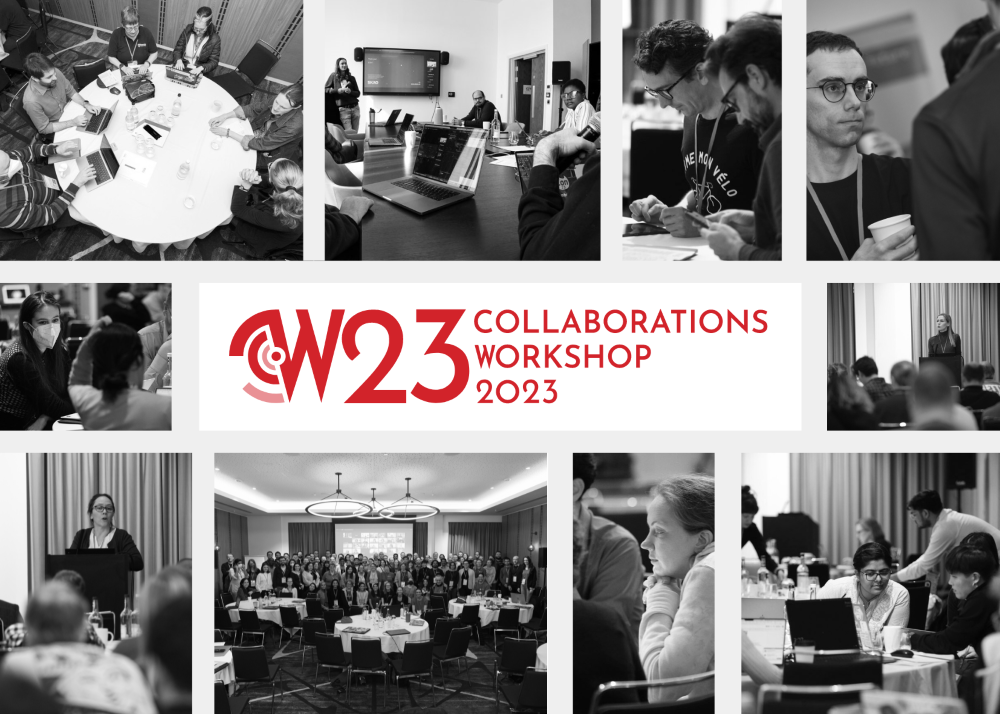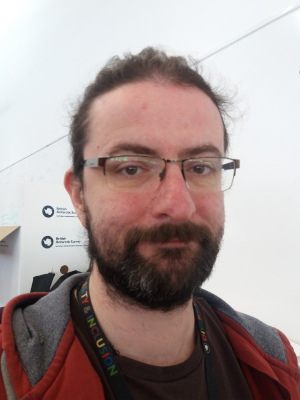Collaborations Workshop 2023 live blog
Posted on 4 May 2023
Collaborations Workshop 2023 live blog
Posted by d.barclay on 4 May 2023 - 12:30pm
 By SSI Fellow James Byrne.
By SSI Fellow James Byrne.
Overview
The purpose of this blog is as a live, in-situ blog around my attendance at Collaborations Workshop 2023, hosted by the Software Sustainability Institute. I figure it would be interesting to record the journey through the conference so that people get a linear, almost (hopefully) journalistic style journey of an attendee!
Day One
Previously I’d only attended one virtual Collaborations Workshop in 2022. Yesterday, I arrived in person at the Hyatt for the conference. It's nice that there was consideration for the impractical journey and accommodation laid on, and it’s a pretty fancy hotel in the heart (from what I know) of the Manchester University campus! This is all great for an RSE on a budget, and knowing the expenses will be repaid by the fellowship is very comforting!
Early introductory coffee chats
I've been to enough conferences in the RSE community to recognise a few faces. Some early conversations reestablish some really nice and exciting vibes based on previous conversations and I'm loving the adequate (if not almost extreme) provision of stickers. It's following up on conversations with representatives from the SSI and The Alan Turing Institute that makes me realise that though I'm not one of life's natural "networkers", I’m glad that I made the effort to have conversations in the past! Those conversations have helped me understand what I’m trying to do within the British Antarctic Survey and Natural Environment Research Council in building a software engineering community and practice. It's also nice to see some fellow RSECon22 attendees!
Talks
Sustainable Career Development is the theme for this year's conference. Looking after career, software and yourself. This is a really great idea for a theme. In trying to grow the RSE community within the BAS/NERC/environmental science sphere, this topic is undoubtedly a key element that we all have to grasp to grow the community responsibly in new areas. The challenge is also to talk to seven people I don't yet know. Neil's advice about unconferencing is resonating with me: this event is all about encouraging participation and being a participant...
Career paths in software
It's nice to hear about different RSE experiences, especially some key lessons that feel like they draw parallels to my own advice I give to anyone who asks me about software engineering (research or otherwise):
- Don't stress about software failing
- Don't stress about failure when seeking new opportunities
- Be broad, transferable skills and adaptability leads to interesting career pivots
- Learn when to say yes AND no
- Pay attention to your personal learning and development
- Mentors (multiple) are people too, and the source of benefits
- Blameless cultures are important (blame the process)
- Impostor syndrome can be cured by mentorship
- Both academia and industry have their benefits and pitfalls, it's never a clear argument
Big respect to the speakers for sharing their career paths! I know from experience it can be quite uncomfortable and they were all really interesting.
I'm wishing to see more representation of non-doctorate software engineers, as there's a chance that we fail to acknowledge the variety of pathways to becoming an RSE.
Lightning talks
The lightning talks are so full on I’ll not blog about these, but definitely worth a watch back to gather what’s happening in the community and check out amazing projects!
Discussion Sessions
Signing up for the "how do you track the environmental impact of computing" session seems very appropriate as this is becoming an ever greater concern for me personally and NERC as a whole. It's always difficult to narrow in on one subject from so many!
The actual session
It was a wonderful smorgasbord of discussion amongst 12 of us, with a variety of disciplines, opinions and reasonings. We’ve got the framework for a really interesting post and it’s really made me appreciate the collaboration and connections that have happened so far in this conference, and through the SSI fellowship. It was great to catch up with a fellow 2022 fellow and speaker at an event I co-organised last year: had it not been for the fellowship and the resulting connections, that event would likely never have worked as well as it did.
Mini-workshop: Pathways to sustainability for research projects and outputs
I've gone to this session to understand how the RAM team, RAMO, from The Alan Turing Institute, communicate their role in making these projects sustainable!
This session very much highlighted what many of us know, that research infrastructure and project sustainability are in their infancy. This very much highlights the importance of the SSI and conferences like this: it feels like it’s important that we're working on how to approach these sustainability pathways, just as with tracking of environmental impacts, in research computing! This session highlighted that the problem isn't solved, but there's a strong consensus that the pathways can and should be developed. Thankfully, I get to collaborate with the RAMOs and the Turing on this within my own role through the IceNet project, so engaging in this session helps give a much nicer, broader context to what they do and where they are generally.
Wrapping up and socialising
Even though I'm not a natural social butterfly, socialising is a lot easier with CW attendees at SSI events than at other technology conferences, primarily because there are so many different research disciplines and approaches represented. I had some really interesting conversations about what's happening in people's careers, that genuinely made me revisit my own and where it's going, or could go. Given the theme of this conference, that seems quite fitting. The conversations also made me realise that RSEs are a minority in name but not in role: many folks are championing the values of RSEs irrespective of their job role.
Day Two
Arriving for coffee and having had a wee chat with a presenter, I'm massively appreciative of attending this year (as I’m at the end of a long run of presenting at events), and of the quiet room to settle in and do some writing. As someone who doesn't like to force social interactions, it's nice to have a space for concentration and reflection before another busy day. In reality, it's not because I don't like socialising, I just need more coffee before my brain works well enough in the morning!
Mini-workshop 2: Research Infrastructure Roles: Perspectives, Paths, and Lived Experiences
I’m attending this session as the NERC digital community still seems to be getting its head around what the research infrastructure roles look like from a governance and structural perspective. It's perhaps useful to look at what The Alan Turing Institute is doing to develop groups around the more traditional RSE-type roles, incorporating other roles such as data and stakeholder engagement roles into the picture.
Some really nice takeaways from the discussions are sentiments such as: when people request research infrastructure roles, they’re hiring best practices arising from knowledge sharing across multiple projects and communities; that there needs to be consideration that professional services capacity is delivered from research infrastructure groups (we consider IT part of support services in my organisation); that these changes are quite often structural; and that if not delivered effectively, career progression is stifled (rather than emergent) and people end up placed in boxes they’ll seek to leave.
Collaborative Ideas Session
With a really interesting conversation around our respective aims and goals for attending workshops, as well as some elaboration on who we were (don't forget to do introductions) we came up with STOPITH: Sending the other Project into Hibernation (a play on STONITH, but for projects.) This was an idea to provide a set of diagnostic tools/processes that can help people responsibly sunset their projects.
I somehow ended up as chair again, but it got me to thinking that having a chair sometimes isn't necessary, and certainly not as onerous as we think. It is basically a backup, as people generally seeming to be fairly good at self-managing and there is such a positive focus on being considerate to others as part of the community attitude (something the SSI are great at promoting.) It seems to me that the role of chair is disappearing as general positive interactions increase, but the aversion to "being the chair" remains!
A really fun session, mainly because it was very collaborative and we managed to synthesize this idea by trying to bring together half a dozen completely independent threads. It was like a natural conversational optimisation, which highlights (if nothing else) the value of the process. In a somewhat ironic spirit of limiting the lifetime of a project that shouldn’t continue, none of us picked up this project for the hack day.
The voting and vote
It's actually quite intense going through somewhere in the region of 15 project ideas/proposals to rate them. I started thinking it would be a quick thing, but then you realise it's well worth putting the effort in, as others did the same for you! The process was like selecting job candidates: sift, refine and order until I rated the top three (and I shall not reveal my vote!!!)
Lightning Talks
As above: the lightning talks are so full on I’ll not blog about these, but definitely worth a watch back to gather what’s happening in the community and check out amazing projects!
Mini-workshop 3: Research Object Hub (RoHub) for FAIR research data management and Open Science in practice
I was very keen to see the ever progressing developments towards streamlining how we approach the discovery of digital assets. Extremely happy to see the example for published assets (IceNet) is actually the project I work on day-to-day! This subject area is very complicated and it's great to see this and workflows like HERMES (picked up from a lightning talk) that try to simplify the processes. By being exposed to these sorts of tools and processes, it's obvious there's a rich ecosystem to engage with and it shows that it is a fast, yet early developing field of middleware applications that support publication of digital research assets.
Conclusions
I draw this blog post to a close at the end of the second day, leaving the hack day and its associated pitches to be unrecorded by my blogging, as I preferred this to be about the conference. Some things should be left unblogged! :)
The closing remarks about the importance of recognising burnout strike home very saliently, as I’m at the end of a run of events and trips away and have a mountain of work. Sadly this and the desire to write up the blogs means I choose to say no to taking on another project as part of hack day (though the pitches were fantastic, I revisit the advice points from above and feel no shame in uncharacteristically avoiding the third day!) As we try to drive positive change within ourselves, our organisations and our wider communities, it's important to remember that there is a limit to what we can achieve, and that change takes a long time to happen no matter how badly we want it to...
...until next year!
- Did I talk to seven new people? Yes, even before the end of the first day!
- How did the participation go!? I thought it wouldn't come to me, but as always, I found the atmosphere most welcoming and even when I got into a position that was not comfortable, the environment and people did everything right to ease the discomfort!

